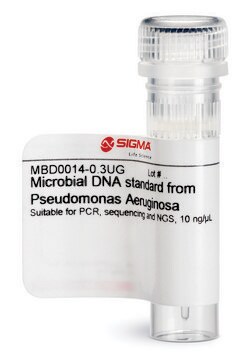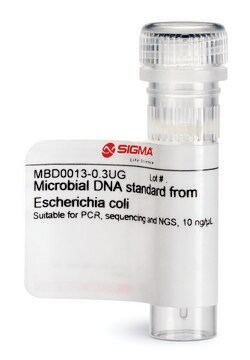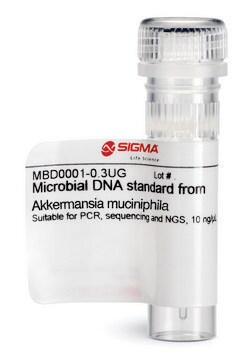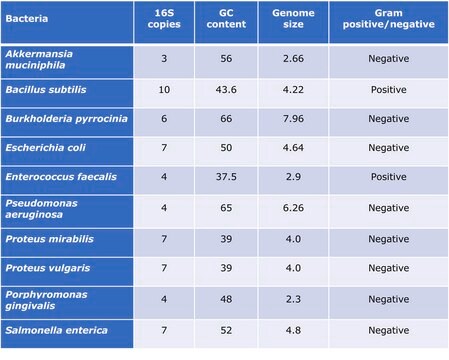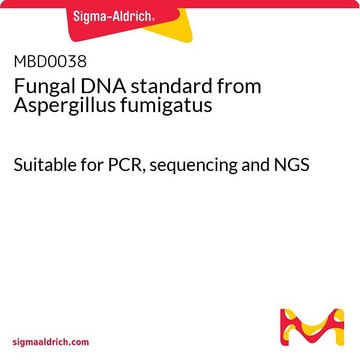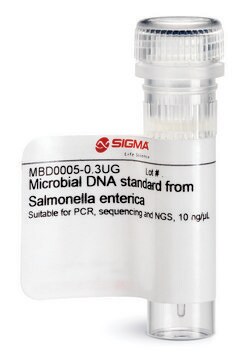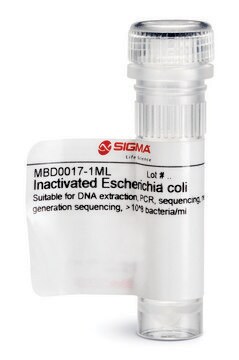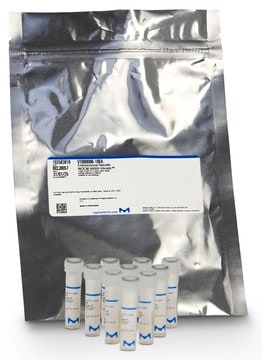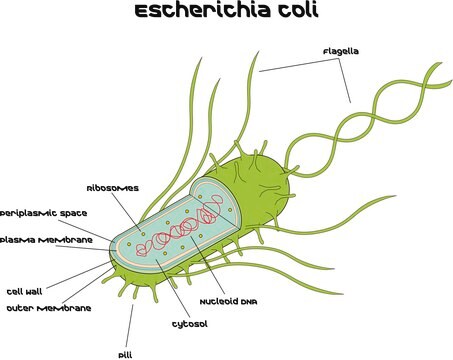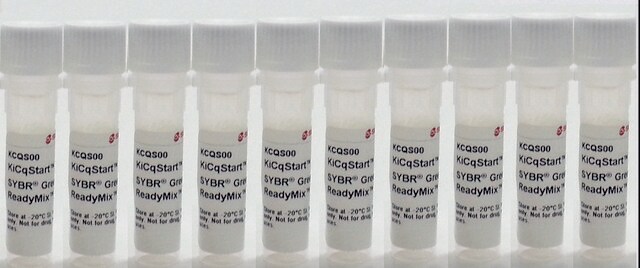MBD0018
Microbial DNA standard from Bacillus subtilis
Suitable for PCR, Sequencing and NGS, 10 ng/μL
Se connecterpour consulter vos tarifs contractuels et ceux de votre entreprise/organisme
About This Item
Code UNSPSC :
41105500
Nomenclature NACRES :
NA.24
Produits recommandés
Niveau de qualité
Forme
liquid
Concentration
10 ng/μL
Technique(s)
DNA extraction: suitable
DNA sequencing: suitable
PCR: suitable
Conditions d'expédition
ambient
Température de stockage
−20°C
Description générale
Microbial DNA standard from Bacillus subtilis (B. subtilis) is a genomic DNA microbial standard that can serve as a standard for benchmarking the performance, along the workflow of microbiomics or meta-genomics analyses. It can also be used as a tool to increase reproducibility and allow comparison of results obtained by different labs. Standardization of sample analysis is currently needed in microbiome genomics research workflow. Lack of standardization can lead to biases and errors in common processes during sample preparation and analysis such as sample amplification, sequencing and bioinformatics analyses. Bacillus subtilis is a gram positive, aerobic bacterium, rod-shaped, endospore-forming, catalase-positive. It is traditionally considered as a soil microorganism. Bacillus subtilis is genetically well characterized and serves as a model organism for important gram-positive pathogens such as Bacillus anthracis, Staphylococcus aureus etc. B. subtilis possess an extreme adaptation ability to various environmental stress conditions by modifying its motility, uptake of exogenous DNA, biofilm formation and sporulation. Recent studies have identified and characterized B. subtilis isolates from human gastrointestinal track suggesting B. subtilis as a gut commensal. Moreover, B. subtilis presence in the gut was found to correlate with probiotic effects such as anti-diarrhea effect, anti-microbial effect, immune-stimulatory effect, competition with pathogens, normal flora growth stimulation and prevention of intestinal inflammation. B. subtilis beneficial effect on gut inflammation may also suggest it as potential probiotic treatment for inflammatory bowel diseases (IBD), including Crohn′s and ulcerative colitis. In addition, it was demonstrated that a peptide produced by B. subtilis possess antiviral effect against influenza virus.
Read here how to use our standards to ensure data integrity for your microbiome research.
Read here how to use our standards to ensure data integrity for your microbiome research.
Application
Suitable for Quantitative standard for PCR, Sequencing and NGS
Caractéristiques et avantages
- Individual microbial standard for microbiomics and meta-genomics workflow
- Suitable standard for PCR, sequencing and NGS
- Improve Bioinformatics analyses
- Increases reproducibility
- Compare results lab to lab
Forme physique
Liquid - The genomic DNA is provided at >=10 ng/μL concentration in TE buffer pH 8.0
Autres remarques
It is recommended to avoid freeze thaw cycles of this product.
Code de la classe de stockage
12 - Non Combustible Liquids
Classe de danger pour l'eau (WGK)
WGK 1
Point d'éclair (°F)
Not applicable
Point d'éclair (°C)
Not applicable
Faites votre choix parmi les versions les plus récentes :
Certificats d'analyse (COA)
Lot/Batch Number
Vous ne trouvez pas la bonne version ?
Si vous avez besoin d'une version particulière, vous pouvez rechercher un certificat spécifique par le numéro de lot.
Déjà en possession de ce produit ?
Retrouvez la documentation relative aux produits que vous avez récemment achetés dans la Bibliothèque de documents.
Les clients ont également consulté
Bacillus subtilis?The Representative of Gram-Positive Bacteria
The Flagellar World, 22-23 (2014)
Subti wiki-a database for the model organism Bacillus subtilis that links pathway, interaction and expression information
Michna RH, et al.
Nucleic Acids Research, 42, D692-D698 (2013)
Amelioration of the DSS-induced colitis in mice by pretreatment with 4, 4'-diaponeurosporene-producing Bacillus subtilis
Jing Y, et al.
Experimental and Therapeutic Medicine, 14(6), 6069-6073 (2017)
Notre équipe de scientifiques dispose d'une expérience dans tous les secteurs de la recherche, notamment en sciences de la vie, science des matériaux, synthèse chimique, chromatographie, analyse et dans de nombreux autres domaines..
Contacter notre Service technique
